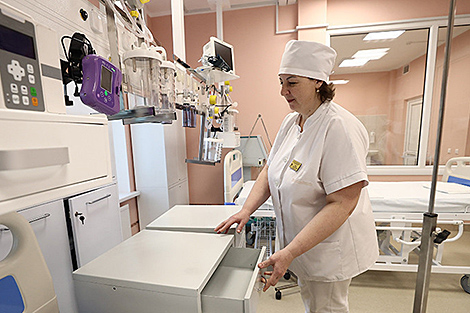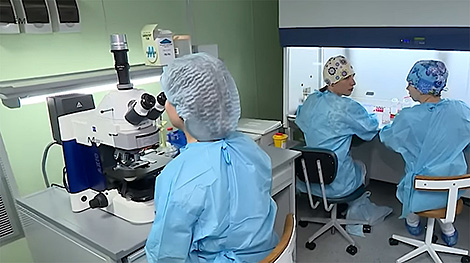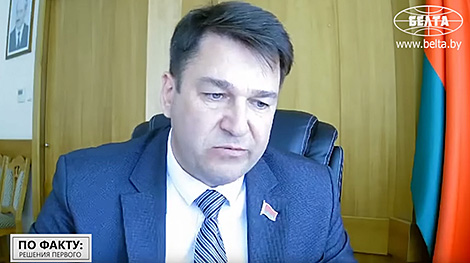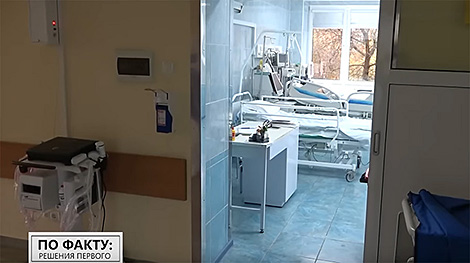News & Events in Belarus
Lukashenko: National healthcare must be tailored to people’s needs

An archive photo
Not statistics but real people who stay healthy. And alive. This criterion to measure the quality and performance of the healthcare system was re-emphasized by Aleksandr Lukashenko just a year ago. The president did it, let’s say, in style at one of the meetings last April. There was a reason to sound the alarm. An independent ad-hoc group traveled across the country to inspect healthcare institutions and identified serious problems in their work. This is despite the fact that healthcare has always been a priority of state policy. The sector uses the most innovative medical technologies, has the latest equipment and mastered the most complex surgeries....
In the new episode of the YouTube project "After the Fact: Lukashenko’s Decisions", we will tell you who and how controls the affordability and quality of healthcare services in Belarus. What does the president call the most important priority of national healthcare? Why will close attention be paid to healthcare in the regions?
Affordable for all
In early April Grodno held a ceremony to break ground for a new hospital. All the experience of recent years was taken into account at the design stage. The coronavirus pandemic has taught the Belarusian healthcare sector a lot. So the new facility, thanks to flexible functionality, will be able to re-purpose its departments quickly.
The president also attended the groundbreaking ceremony. By his participation in this seemingly mundane event, Aleksandr Lukashenko once again demonstrated that there are no unimportant issues in healthcare. Here he once again recalled his main requirement.
“We need to make healthcare, as we used to say, a sector for people. Affordable for all; high-quality standards for everyone.”
The president always talks about the affordability and quality of healthcare services! Both at meetings in Minsk and at events in the regions. It would seem that the tasks for officials of various levels are spelled out in the most specific language. Yet, as we see, not everyone understands their importance or rushes to implement them.
Why does Lukashenko criticize the national healthcare
Just a year ago, in May, the president held a meeting on topical healthcare issues. It was attended by senior officials of the Healthcare Ministry, governors and heads of regional healthcare departments, rectors of medical universities, chief physicians of hospitals, directors of some national research centers. The conversation turned out to be very emotional. The head of state immediately indicated that there were a lot of reasons for discontent in the system. An independent ad-hoc group that was set up on the instruction of the head of state confirmed this.
"On my desk I have detailed reports from the ad-hoc group and from the regulatory authorities. Don't think that I set a task for this group and will leave things at that. The laws must be observed. The Prosecutor's Office controls the uniform strict observance of laws in Belarus. We have a powerful controlling body - the State Control Committee. It acts on behalf of the authorities in the interests of the people. The Committee also had a look at the situation in healthcare and filed its report. I have studied these materials very thoroughly, and something surprised me the most, namely the glaring problems in some hospitals, clinics, village first-aid stations. They have walls and ceilings collapsing, doors warped, elementary sanitary rules disregarded. Meanwhile, any healthcare institution must be a paragon of hygiene. Even some pediatric units are in poor condition. Listen, this is children! Or are they not your children? Of course, these are not your children. But these are my children!” the head of state noted
After this meeting, many noted that the president was enraged! Personnel decisions seemed to be not long in coming. What else would you expect? It was hard not to be riled up and outraged in such a situation. This topic had been raised so many times before! Healthcare issued were brought up by the president many times over the past 10 years.
During a meeting with the academic community in January 2014, the president raised healthcare issues and said literally the following: “We have invested tremendously in reshaping, upgrading and bringing the healthcare system up to the highest standards.”
A year later, April 2015, BelTA released an article that read: “Lukashenko demands flooding Belarus’ market with high-quality domestic medicines.” The president also mentioned this important topic in his Address to the Belarusian People and the National Assembly. He emphasized that Belarus’ healthcare system ranks very high in the world. “Medical facilities of various specializations have been set up in the capital and regions. Hospitals are equipped with the latest technology, and clinics are modernized,” he remarked.
On 18 June 2016 Lukashenko met with Spartak factory workers. The conversation touched on healthcare and education. Lukashenko stood his ground again. Verbatim: “Healthcare and education are of critical importance.”
A year later, in 2017, the president set a task to create a center for organ and tissue transplantation in Belarus in order to reduce waiting times for transplant surgeries.
Ground zero. Dr Rummo about branching into transplant surgeries
Director of the Minsk Research Center for Surgery, Transplantation and Hematology Oleg Rummo noted that the head of state has always prioritized the development of the healthcare sector. In particular, he provided all kinds of support to the research center.
“Our center is probably very lucky because the head of state has always paid great attention to the development of high-tech medicine. And our center is one of the top facilities providing advanced medical services to Belarusians and foreigners,” Oleg Rummo said.
“The president visited us for the first time when we re-opened one of our buildings after a major overhaul. The overhaul had been approved by the head of state during his meeting with our team in 2008, the year when we performed our first liver transplant surgery,” he recalled.
The head of state came to check how his instruction to set up a unit for transplantation of organs and tissues at Hospital No. 9 was fulfilled. He was briefed on our achievements that were still pretty modest back then. This is a very useful, promising, high-tech field of medicine that could help 400-600 Belarusians annually at that time. When it all started, only eight organ transplant operations had been performed in Belarus.
This new project was expected to help boost international cooperation, strengthen the international standing of our healthcare system, introduce cutting-edge technologies and then scale them up throughout the country.
Due to new technologies, the number of patients who could get a chance for a new quality life could increase from 400-500 to several thousand annually, the doctor remarked.
“In 2017, the head of state paid another visit to our center. At that time, the center had already gained recognition far beyond Belarus. We had already performed liver transplant surgeries for adults and children in Kazakhstan. A huge number of patients from all over the world, including Israel, Japan and all former Soviet republics, mostly Ukraine, sought to get treatment at our center,” Oleg Rummo noted.

Oleg Rummo emphasized that the waiting list for kidney transplant surgeries in Belarus is one of the shortest in the world. “There is a waiting list for such surgeries in all countries of the world. Patients are placed on such lists even in those countries that have much bigger resources and capacities than the Republic of Belarus. For example, in the UK, the waiting list for surgeries is six months or longer. We believe that such a long wait is unacceptable and we try to minimize the waiting time, especially for cancer patients, as time is not on their side. The same applies to cardiac patients, as they can die or live very low quality lives without a surgery. Therefore, we made sure that we had one of the shortest waiting lists for kidney transplantation in the world,” the director of the research center informed.
“Belarusians wait 151 days for this surgery on average. In the UK, the waiting time is more than 1,200 days. You can compare. The number of such surgeries per million people here is bigger than in Poland, Germany, and the Baltic countries. I’m not even talking about our closest friend and neighbor, the Russian Federation,” he noted.
“Thus, we have provided our people with this high-quality, sophisticated and expensive type of medical care. The situation is about the same in cancer treatment, cardiac surgery and other areas of high-tech medicine. And it's very gratifying,” Oleg Rummo emphasized.
Lukashenko: I will never forgive you for neglecting rural communities.
The president has said more than once that the national research and treatment centers are flagships of the Belarusian healthcare system. And it is important to ensure accessibility and high quality of healthcare services at all levels. “I will never forgive you for neglecting rural communities. Never! Keep this in mind. First and foremost, governors. I'll skin you unless you put things in order there!” the Belarusian leader stressed commenting on the situation with healthcare in rural communities.
“You can shut them down, optimize them, I don’t mind,” said the head of state. “But before you close first-aid stations, you need to bring in mobile medical units,” the head of state said.
According to Grodno Oblast Deputy Governor Viktor Pranyuk, the region stopped shutting down rural first-aid stations.
“Medical services for rural residents of Grodno Oblast are provided by 17 nursing hospitals with a total bed capacity of 858; there are also 11 community hospitals, 98 general practitioner outpatient clinics and 197 first-aid stations. We also purchased 11 mobile first-aid stations,” Viktor Pranyuk said.
“Grodno Oblast stopped shutting down these facilities. In principle, this number of first-aid stations is sufficient,” the deputy governor said.

“We regularly do major and current repairs. We have ambitious renovation plans for this year. But there are some very obsolete first-aid stations and it does not make sense to renovate them. They don't have hot water or adequate sanitary conditions. Therefore, as an experiment, we decided to introduce modular first-aid stations in Novogrudok District. Two first-aid stations have already been manufactured and mounted. They are made by Novogrudok Metal Products Plant. The frames of three more stations have already been installed. They will replace those first-aid stations that required major repairs,” Viktor Pranyuk said.
“A major overhaul would be an extremely costly thing estimated at millions of rubles, while making a new modular station would cost Br97,000-110,000 (including equipment). This is a completely new facility with video surveillance, fiber optics, and other amenities,” he noted.
He added that there are 11 mobile first-aid stations in the region, which have been operating as mobile medical complexes since March. This makes it possible to bring doctors and specialists to rural areas for consultations and treatment.
An issue of no less importance, which the president always raises, is human resources. Young specialists should be provided with well-equipped workplaces and accommodation. People who have been working in the districts for years should be offered regular advanced training courses.
Five years ago in a video conference with students and academic staff of the country’s medical universities, Aleksandr Lukashenko named one of key priorities of the national healthcare: training of highly qualified specialists. You must agree that no equipment, even the most advanced one, will be able to treat people without highly skilled professionals. The head of state always reiterates this.
Today, various formats of providing medical care in rural areas are used in order to ensure the professional level of medical workers in the regions. According to Viktor Pranyuk, in a number of cases it is also possible to successfully combine this work with the opportunity to raise the professional level of medical specialists working in the districts of the region.
“We organized onsite trips to the districts of Grodno Oblast for the staff of Grodno State Medical University. As of 15 April 2024, a total of 97 specialists made 30 visits and consulted almost 1,000 patients, held seven case conferences for young specialists, eight workshops and so on. This is a continuous process with all stakeholders involved,” Viktor Pranyuk said.
“Besides, all medical centers of the region are connected to the unified telemedicine system in order to provide medical assistance to patients living in remote communities. Over 23,000 tele-consultations were conducted in 2023. This also contributes to the professional growth of young specialists who work in rural communities. They receive consultations thus enhancing their professional level,” the Grodno Oblast vice governor said.
“Young specialists who work in rural communities have the opportunity to improve their skills and get on-the-job training. In 2023, a total of 523 young specialists working in medical institutions in the rural communities of Grodno Oblast completed training courses,” Viktor Pranyuk said adding that 392 specialists improved their qualifications, 133 underwent on-the-job training.
“These are obligatory rules. We can also see the interest of medical specialists in improving their qualifications,” the Grodno Oblast vice governor said.

Do you respect me? Why can medical workers in Lithuania deny treatment?
Last year the number of doctors’ appointments, including routine check-ups (excluding dentists), exceeded 93 million. The number of home visits by doctors amounted to more than 7 million. The number of ambulance calls exceeded 2.6 million! Calls are free of charge, even when a patient’s condition turns out to be a non-emergency. A paramedic will always give necessary recommendations. If it is an emergency case, a patient is taken to hospital right away. More than 2.5 million people who sought medical help were hospitalized last year.
Meanwhile, Lithuania has decided to introduce a selective approach to providing medical help. On 9 May, the Seimas of Lithuania adopted amendments to the law “On Patients' Rights and Health Damage Compensation”. Starting from 1 January 2025 Lithuanian medical workers will have the right to deny treatment if they consider the patient's behavior aggressive or disrespectful.
Of course, this does not mean that doctors should not be protected from violent patients... But how can we measure the level of respect?
Fortunately, Belarus has it differently - free medical care for all and decent support for healthcare workers.
President always insists on putting people first
Any citizen has the right to receive medical care in Belarus. It does not matter whether you need a consultation at a polyclinic or there is a need for hi-tech operations. This is what the president has been seeking from those responsible for the national healthcare system all these years. Therefore, he draws attention not only to the successes of doctors, but also to shortcomings in their work.
Oleg Rummo, dwelling on the availability of healthcare in the country and in the world, as well as on why the president of Belarus pays such close attention to the development of the healthcare system in the country, said that healthcare is a very important area of people's lives.
“When there is no health, there is nothing. A person does not need education, although this is also very important, a person does not need entertainment, although they cannot live without it, a person does not need intellectual nourishment, because health is paramount. A healthy nation is the key to the development of a full-fledged state,” Oleg Rummo said.

“It is understandable why the state, which is focused on improving people’s welfare, first of all pays attention to public health. Other things are important too. I mean upbringing, education, sport and so on. But health is of paramount importance. It is essential to have a balance between affordability and high technologies. No one in the world has yet been able to achieve this balance. So far, everyone is trying, and we are trying, although we are not the richest state on Earth,” he said.
“If this help is not available, then no matter how highly qualified we are, we will be useless if we treat 3-5 people using state-of-the-art equipment and if we perform super-complex operations. We need to create a system to help people as much as possible. The investments have been considerable and need to be concentrated in one place to reduce the cost of using technology,” the director of the Minsk Research Center for Surgery, Transplantation and Hematology said.
In his words, the efficiency criterion is the result. “If our life expectancy is growing, if the incidence of cancer is not increasing significantly, if we can prevent an increase in cardiovascular diseases if, thanks to transplantation, we can help people get back to normal life and turn the disabled into the abled who can live, work and raise children, then we are doing everything right,” Oleg Rummo said.
“Well, it is clear that every doctor believes that they are doing everything right, that they are sinless and the course they have chosen is the best one. But in fact, it is very important to consult with people who know the latest in technologies, like the ones that we have. People's opinion is very important. The head of state always feels the sentiments in our society. Therefore, he is not carried away by the statements about our successes, and wants us to think about people first of all and try to make sure that no one is left without qualified medical care. It's very difficult,” Oleg Rummo said.
If there is a problem, there will be a solution. The president will never allow it otherwise. A month ago the head of state made this clear once again during his trip to Grodno to attend a groundbreaking ceremony for a new hospital.







 print version
print version make home page
make home page add to bookmarks
add to bookmarks

